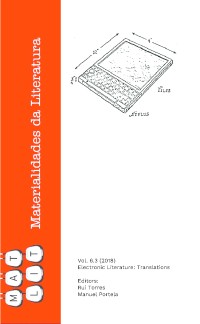Please use this identifier to cite or link to this item:
https://hdl.handle.net/10316.2/44382| Title: | ‘Writing for’ with authority: theorizing an electronic edition of Shahriar Mandanipour’s Censoring an Iranian Love Story | Authors: | Wright, David Thomas Henry | Keywords: | authority in fiction;electronic literature;literary theory;palimpsest;Shahriar Mandanipour;translation;autoridade na ficção;literatura eletrónica;teoria literária;palimpsesto;Shahriar Mandanipour;tradução | Issue Date: | 2018 | Publisher: | Centro de Literatura Portuguesa Imprensa da Universidade de Coimbra |
Abstract: | Censoring an Iranian Love Story [Censurando uma história de amor iraniana] (CAILS) por Shahriar Mandanipour (2009) é um romance escrito para ser tradu-zido. Apesar de escrito em Farsi, este texto original ainda não foi publicado. CAILS apresenta simultaneamente a história de amor do título (negrito), texto censurado preventivamente antes de ser “submetido” ao Ministério da Cultura e Orientação Islâmica do Irão (negrito rasurado), e explicações sobre por que ocorreu a censura (texto romano normal). A voz de Mandanipour tem a autoridade que advém da escrita em língua materna, mas ao escrever para tradução, ele nega o privilégio autoral. Um texto eletrónico não hierárquico que permita ao leitor alternar entre texto “original,” texto censurado e texto “anotado,” bem como essas opções no Farsi original, poderia restaurar a autoridade do autor. Ao teorizar sobre tal edição, exploro a possibilidade de uma forma romanesca que possibilitaria e capacitaria escritores não-anglófonos a cruzar fronteiras linguísticas, sociais, culturais, políticas, religiosas e censórias. Censoring an Iranian Love Story (CAILS) by Shahriar Mandanipour (2009) is a novel written for translation. Despite being penned in Farsi, this original text has yet to be published. CAILS simultaneously presents the initial titular love story (bold), pre-emptively censored text before it is ‘submitted’ to the Iranian Ministry of Culture and Islamic Guidance (bold with strikethrough), and explanations as to why censoring occurred (roman). Mandanipour’s voice has the authority that comes with writing in a mother tongue, yet in writing for translation he disavows authorial privilege. A non-hierarchical electronic text that enables the reader to shift between the ‘original’, censored, and ‘annotated’ text, as well as these options within the original Farsi, could restore authority to the writer. By theorising such an edition, I explore the possibility of a novelistic form that would enable and empower non-English writers to cross linguistic, social, cultural, political, religious, and censorship boundaries. |
URI: | https://hdl.handle.net/10316.2/44382 | ISSN: | 2182-8830 | DOI: | 10.14195/2182-8830_6-3_7 | Rights: | open access |
| Appears in Collections: | Matlit |
Files in This Item:
| File | Description | Size | Format | |
|---|---|---|---|---|
| writing_for_with_authority.pdf | 920.25 kB | Adobe PDF |  |
Items in DSpace are protected by copyright, with all rights reserved, unless otherwise indicated.
